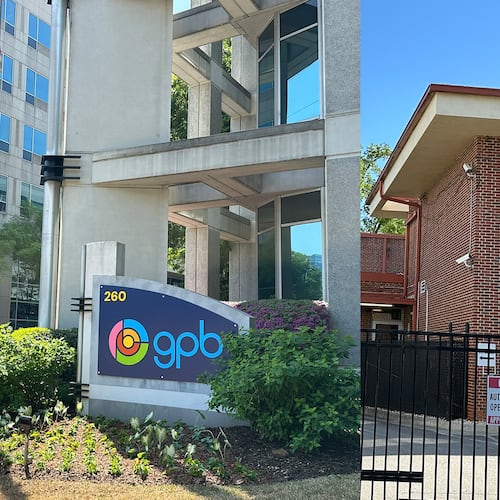More than a month after one of his company’s trains broke apart in a fiery crash that released toxic chemicals into the air soil and water in East Palestine, Ohio, Norfolk Southern CEO Alan Shaw will testify before Congress at a Thursday hearing focused on environmental and public health threats from the rail disaster.
Shaw will face questions from the U.S. Senate Committee on Environment and Public Works. Shaw’s testimony comes as Atlanta-based Norfolk Southern has faced increasing pressure from public officials, criticism from the public and anger from affected residents since the Feb. 3 crash.
The pile up and subsequent controlled burn of toxic vinyl chloride in railcars to prevent an explosion has prompted calls for tighter rail safety regulations, demands for more information on the safety of water, soil and air in the area, and questioning about how Norfolk Southern has responded to the public about their concerns.
Another Norfolk Southern derailment on the other side of Ohio has only further shaken many in the public about rail safety.
Here’s what to know ahead of the Congressional hearing:
New Details?
Thursday’s hearing could reveal more details about the impact of the crash or Norfolk Southern’s efforts to prevent future accidents.
The NTSB released a preliminary report on the East Palestine derailment saying the crew received a warning about an overheated axle just before the train jumped the tracks.
The railroad uses sensors to detect heat from a bearing before it fails from overheating. The threshold that triggers the alarm is set by the railroad.
The Federal Railroad Administration last week issued a safety advisory recommending railroads evaluate the thresholds for inspections, ensure proper maintenance of the detectors and improve their safety culture.
Norfolk Southern this week announced a new safety plan in an effort to address some of the concerns. It said it plans to add about 200 hot bearing detectors to its network, with the first installation on the western approach to East Palestine, the path the train took before it derailed.
The railroad said it is partnering with the Georgia Tech Research Institute to develop advanced safety inspection technology using artificial intelligence to find defects that need repair “much more effectively than traditional human inspection.”
Norfolk Southern also said it is adding more acoustic bearing detectors to identify potential problems.
Senate panel
Ohio’s two U.S. senators, Sherrod Brown, a Democrat, and J.D. Vance, a Republican, are both harsh critics of Norfolk Southern. They along with U.S. Sen. Bob Casey, a Democrat from Pennsylvania, will be on the first panel.
Brown and Vance have introduced a bill co-sponsored by Casey and other senators to tighten rail safety regulations. It would improve safety procedures for trains carrying hazardous materials, establish requirements for defect detectors, require two-person crews and increase fines for wrongdoing.
“The rail companies cut costs by cutting corners ... communities like East Palestine be damned.” Brown said on the Senate floor last week.
The derailment occurred next to the Ohio-Pennsylvania border, forcing some Pennsylvania families to evacuate. Casey and other officials last week pushed Shaw to provide assistance to people affected in Pennsylvania after some of them were turned away from Norfolk Southern’s family assistance center.
Pennsylvania Gov. Josh Shapiro this week said he met with Norfolk Southern and demanded they pay millions in damages to Pennsylvania and its residents. He said Norfolk Southern had committed to the funding.
Agencies on the ground
On a second panel of witnesses, Shaw is scheduled to testify along with officials from the U.S. Environmental Protection Agency, Ohio Environmental Protection Agency, Ohio River Valley Water Sanitation Commission and Beaver County Department of Energy Services.
The EPA last month issued an order to Norfolk Southern to clean up all of the contamination according to an EPA-approved work plan, or otherwise pay triple the cost for EPA to do it.
The Ohio EPA is helping to oversee the removal of contaminated soil from the derailment site.
State environmental protection agencies can also play a role in protecting waterways.
In Georgia, the state Environmental Protection Division last month levied a $10,000 penalty against Norfolk Southern for a train derailment in Gainesville last year that spilled soybeans into Flat Creek, which the Chattahoochee Riverkeeper said reduced oxygen levels in the creek and killed dozens of fish.
In Ohio, state officials says the derailment and resulting contamination of creeks in the area killed tens of thousands of fish.
More derailments
There are more than 1,000 derailments a year, many of them in railyards. The vast majority don’t release hazardous materials.
But since the East Palestine derailment and chemical spill, there has been growing alarm about such incidents.
Nearly two weeks after the Feb. 3 disaster, a Norfolk Southern train derailed in Michigan. It caused no injuries and no hazardous materials were released.
Another derailment occurred near Springfield, Ohio, on Saturday. There were no hazardous materials aboard the train, but the National Transportation Safety Board is investigating the incident.
The NTSB is also investigating the death of a Norfolk Southern conductor in Cleveland, Ohio on Tuesday morning. The conductor was struck by a dump truck as a Norfolk Southern train was moving through a railroad crossing, according to the railroad.
On Tuesday, the NTSB announced a new investigation into Norfolk Southern’s safety practices and culture, citing five incidents dating to December 2021.
How to watch
The hearing is expected to start Thursday at 10 a.m. and you can watch it here on AJC.com. It will also be livestreamed on the Senate Committee on Environment and Public Works’ website, and is scheduled to air on C-SPAN 3.
The AJC’s Michael E. Kanell contributed to this article.
About the Author
Keep Reading
The Latest
Featured



